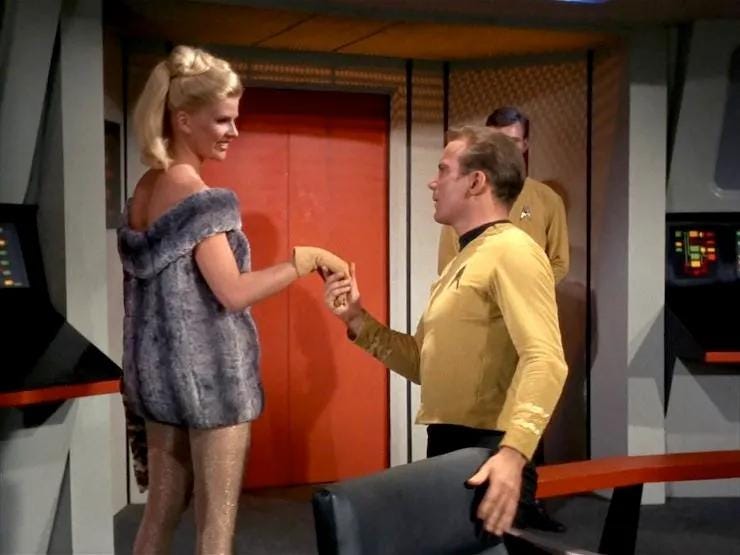Space Hamlet
This episode, “The Conscience of the King,” came along at an opportune time, as it affords me an observation on matters other than how dumb the sets look and how cheap and threadbare the Federation uniforms are. To wit: Kirk is a passionately moral man. In retrospect, I probably accumulated a lot more of his ethos than I did of any religious education I may have brushed against, which in my young mind was entirely about guys slaying guys with the jawbone of an ass and Assyrians coming down like the wolf on the fold—the action stuff. It certainly would be in the compass of Kirk’s abilities to slay someone with the jawbone of an ass; he’s done more with less on occasion. But Kirk doesn’t kill unless it’s a last resort, which is part of what makes his thirst for vengeance in the Wrath of Khan so shocking; Khan, in killing Kirk’s son, found a weak point in Kirk’s moral armor and we all watching knew it.
This, by the way, is one reason the recent J.J. Abrams reboot of Star Trek is a loud, empty vessel. Kirk’s character is vastly different from the one we have long known—governed by his passions, cocky to the point of arrogant, and seemingly devoid of any inner life. It’s pretty much the exact opposite of what drew people to Kirk and Spock and Star Trek in the olden days, and while overvaluing the past is a common human foible, I’m just here to say that it was the throughline qualities of the characters, from the start of the series through the films, that makes Star Trek possibly unique among, if I may deploy so grotesque a word, franchises. There was true continuity to those characters, not just a series of unconnected episodes like James Bond or the serial trilogies of Star Wars, in which the universe is more or less consistent but characters flicker to life for a triad of stories followed by a generation’s worth of silence and a final cameo to cap the tale of a person we largely haven’t heard from in a while but probably will later with a different congress of actors in a demoralizing series of reboots lasting until the collapse of civilization.
Star Trek’s characters, on the other hand, matured and grew old in such a natural way, as indeed their physical existences were tied to the lives of this group of actors plucked from the bottoms of credit sequences by a series of strange turns of fate. As Leonard Nimoy reminded us in his 1975 autobiography I Am Not Spock, he wasn’t Spock. But at the same time—as he reminded us in his 1995 autobiography I Am Spock—he actually was Spock. Spock’s entire existence was a facet of Nimoy’s life over almost fifty years.
Point being, the qualities of those characters weren’t just the product of an episode or a series; each was the product of a life of craft, and our faith in them was earned.
And Kirk, as I say, was a passionately moral man.
It’s a funny thing to say about a character who often seemed thickly greased with casual misogyny, but this is frankly a failing of the show more than the character. Kirk’s remarks about woman and his incessant bedding of them is not ironic; it’s not used to demonstrate a flaw or weakness—quite the contrary: the shrapnel burst of his virility is, within the context of the show, the source of much (though not all) of his strength. This was tempered over the years as actor and creator grew older and, well, less virile, but to the best of my knowledge nobody ever apologized for it; like any truth-seeker Kirk prunes his own philosophy as his wisdom waxes. At no point though does he diverge from his moral framework, whatever it is at any stage. Putting it in the sad argot Instagrammers everywhere, he always strives to be his best self.
That said, Kirk screwed almost every woman he met. You always knew it was coming when camera focused on the demure beauty with magnificently coiffed golden hair and sparkling blue eyes lit with a swath of gauzy light across a face otherwise in shadow. Kirk bout to get some, you’d mutter to yourself as you splayed across the couch gnawing a fried chicken leg and struggling, greasy-fingered, to seize a can of beer from the detritus-strewn coffee table. He’s out of the gate like a champion race horse, and every lover is flushed down the memory hole at the end of the episode. It’s wild.
The surprise villain of this episode, Lenore,1 first emerges from a very 1967 cocktail party, a vision in lavender mink tube top and bouncing flaxen hair, teeth bright enough to burn your shadow on the wall behind you as she exchanges two or three smoldering remarks with Kirk before he invites her to come with him somewhere more private. I like to imagine that among the books on his shelf in his sparse cabin is at least one titled How to Pick Up Women Like a Pro.
But let’s not get too far afield. Kirk, as I have noted, is a passionately moral man. He’s using his powers for good; seducing the nineteen year old2 daughter not just for kicks but as a “tool to use against my father,” as she says when she discovers the truth. The truth is that her pop, supposed galactic thespian Anton Karidian, is actually a fella by the preposterous space-name of Kodos, who was responsible for the deaths of several thousand colonists some twenty years earlier. Kirk, see, was one of only nine eye-witnesses who saw Kodos and lived to tell the tale, and the others of this select group have been getting themselves murdered, always within a quick jogging range of Karidian’s troupe.
Is the Shakespeare-mumbling, scenery-chewing Karidian really Kodos? That’s what we supposedly spend the whole episode puzzling over. Two other witnesses who, very coincidentally, happen to be coworkers of Jim Kirk down at the space plant, wind up targets of assassination attempts, the first successful, and the second, involving a glass of milk, a phial of poison, and Riley—Riley, the Enterprise’s resident leprechaun who featured so absurdly in “The Naked Time”, back for a second kiss of the Blarney Stone—unsuccessful.
The assassin also takes a shot at Kirk but the hit is hilariously crappy—an overloading phaser that makes a deafening noise for several minutes until Kirk finds it and turns it off. Whee. Action.
Meanwhile, Riley, recovering from his attempted poisoning, discovers who Karidian is suspected to be and, seeking vengeance for his family murdered by Kodos, heads off to do a little murdering of his own. Kirk stops him but Karidian overhears their conversation and realizes he’s being hunted. This prompts Lenore, in a bid to soothe his fears, to explain to him that she’s hunted down and killed all but these last two of the witnesses to his crimes and that by Yorick’s skull she’s going to get them too.
It’s not really that much of a surprise but it is a nice narrative turn if only because it reveals that the point of the episode isn’t so much about how it’s bad to murder 4,000 people as it is about the fact that corruption leads to corruption. Karidian is mortified as any loving parent would be, but Lenore is clearly completely off her rocker. Bursting into this tense situation comes Kirk, who having been overheard, overheard himself and so moves to arrest both miscreants. Lenore grabs a phaser off the completely useless security guard daydreaming next to her and fires a round at Kirk, but Karidian, redeeming himself in the end, dives in front of the killing blow.
The incognito Kodos, of course, villain of events twenty years prior, is an analog to the incognito Nazis from the same interval of time, who still wandered the landscape in 1967, picked off one by one by Simon Wiesenthal and the rest of the great Nazi hunters. It’s become a commonplace that science-fiction is all thinly-veiled parables for the time in which it was created, but Star Trek was probably the first television show to embrace the idea. I don’t know if Gene Roddenberry thought of himself as a hippie or anything like that but like George Orwell he had a pretty strong streak of counter-culturism about him and his work informed by an implicit critique of the ills he saw in the world he had inherited—the Holocaust, mechanized and increasingly computerized warfare, totalitarian movements. It seems pretty reasonable to posit Kirk as an idealized version of Roddenberry himself: embarking on this great adventure with a crew of miracle workers; always seeking to do good; connected to a large, often impersonal organization but always his own man, never a cog in a machine.
Curiously, this episode also featured the last appearance by Grace Lee Whitney as Yeoman Rand. She would return in the films in response to fan clamor, but for the time being it wouldn’t do to have a pretty woman hanging around with her eyes drilling holes into the back of Kirk’s head while he was busy luring the girlfriend of the week back to his cabin with its scratchy red blankets, upon which one could bounce a quarter, so tight and smoothly were they stretched across the plywood bed. And so they shit-canned her. Whitney’s story is not a particularly happy one but the original series wasn’t really equipped to handle both the proposed relationship between Rand and Kirk and Kirk’s serial womanizing. Honestly it was never particularly realistic or nuanced about any relationships beyond maybe those of its main triad: Kirk, Spock, and McCoy. It was for later series to begin delving into deeper emotional territory, and if I may be so bold I’ll say that often the result is more like soap opera than science fiction. The original series is simpler. The issues are largely black and white, and if there is ambiguity it gets sorted with some sort of clever moral judo and maybe a short speech. It was stupid, obvious, and yet deeply reassuring at a time when it wasn’t unreasonable to expect to be vaporized by the Soviets at any moment. We could use such reassurance today.3
Spoiler. Sorry.
DiCaprio Shatner, at 36, was almost twice her age.
The Great British Baking Show serves the same purpose but with misogyny.




